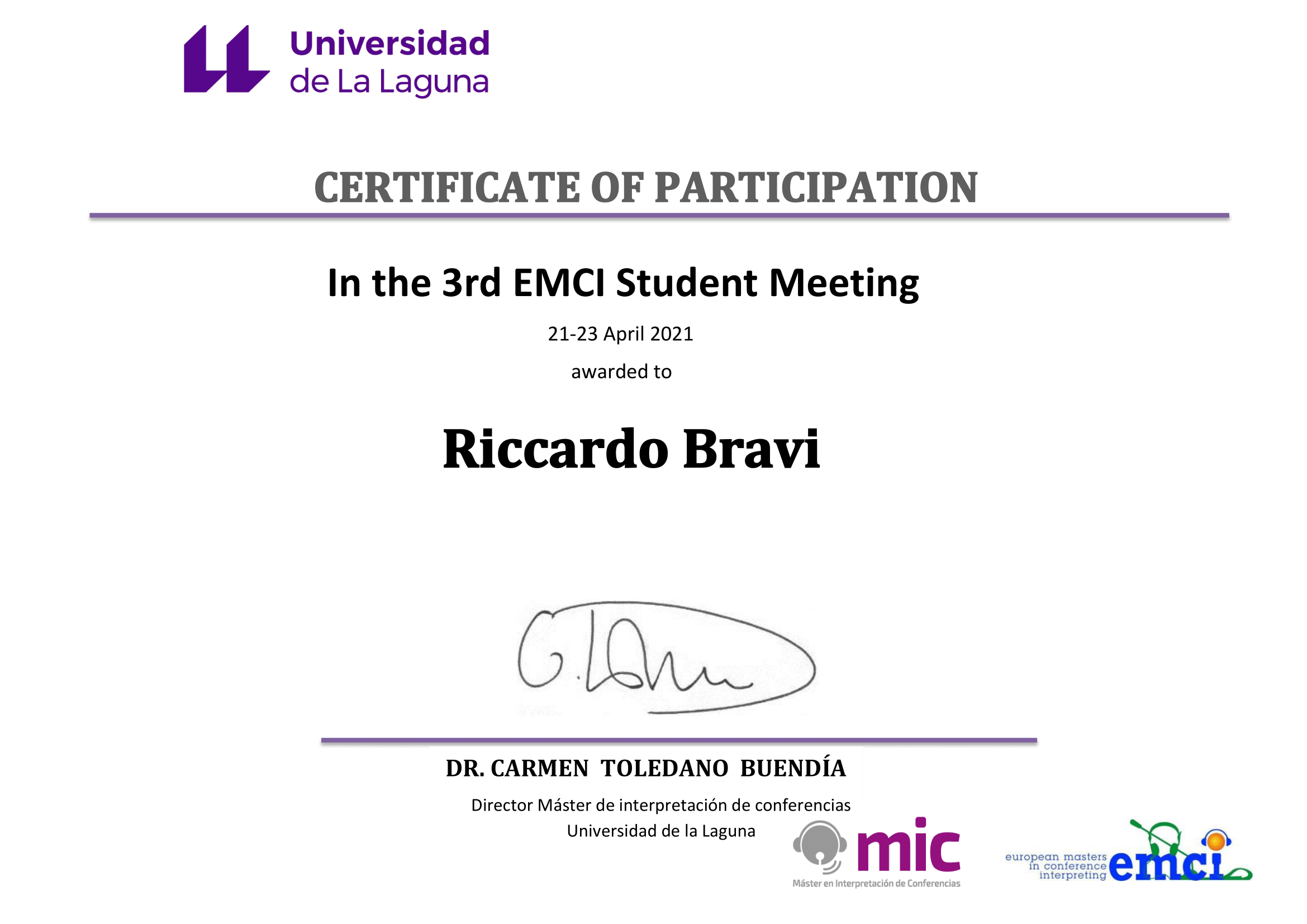Laurea magistrale
I attend the Master's Degree in Interpreting at DIT - Department for Interpretation and Translation at University of Bologna, Forlì Campus.
My working languages are: Italian (native), German as an active and passive language (B) and English as a passive language (C).
This is not an official statement of the University.
- Here is an overview of the courses I attended and their content.
- This Master's degree is very selective because only 30 elegible candidates per year pass the highly demanding admission test out of various dozens of participants.
- The Master's degree is held in close collaboration with DG Interpretation of the European Commission and is part of the excellence network EMCI - European Masters in Conference Interpreting and of CIUTI - Conférence internationale permanente d'instituts universitaires de traducteurs et interprètes. This ensures elevated teaching quality .
- DIT is a strong supporter of technology for interpretation and translation.
These are the main courses of the Master's degree in Interpreting. Speeches of various topics are used: economics, technology, current affairs, politics between Italian and German and from English into Italian.
In the second semester of the second year specialized speeches are interpreted. We deal with Law and Economics. Penal and civil Law, patents and trademarks, counterfeiting, family law, Common Law/Civil Law, Eurojust and Europol, customs.
German and English language for the interpretation of a broad variety of text genres both written and spoken.
Linguistics essentials for oral discourse analysis. typical oral language mechanisms analysis like boosters and hedges, anaphors, cataphors and deixis. This is a theoretical foundation for booth practice.
Theoretical and practical analysis of specialized terminology in economics and medicine. Specific and collateral technicisms and socio-rethorical conventions in specialized speeches.
Analysis of public communication for institutions and businesses to meet clarity and accessibility standards.
Two courses (Foundations and Advanced) based on IT programs to build manual and semi-automatic language corpora. Use of software developed by DIT to support the interpreting profession. BootCat and AntConc for corpora production and analysis. SDL Multiterm for glossary management. InterpretBank for preliminary and live glossary search. DitTafono university-owned web app for live subtitling (respeaking) for hearing impaired people.
Overview of the history of Interpreting Studies, fundamental theories on interpreting practice but also on interactional and cognitive approaches to interpreting.
Intensive practical course on voice use, posture and body language. Neutralization of Italian regional accents through Italian pronunciation analysis and practice. The aim is to raise awareness on the importance of personal presentation and image depending on job setting. Theatre monologue recitation and speech in a mock conference for live stress management.
DIT enables you to do an internship in various locations to enhance self entrepreneurship.
- I interpreted at some university conferences between German and Italian on cinema and philosophy.
- I interpreted at a meeting with virologists Prof. Andrea Crisanti and Prof. Dr. med. Lars Dölken for Alumni DAAD Italien (ADIT) and Heidelberg Alumni Italien (HAIT).
- I took part in a dummy booth during an interview with former Consul General of Germany in Milan Claus Robert Krumrei for ADIT and HAIT.
I translated the website, the virtual tour and written the subtitles into English of videos for CARITRO Banking Foundation in Trento and Rovereto (Trentino-Alto Adige – Südtirol).
- I accomplished my internship in Weimar (Germany) for Vereinigung Deutsch-Italienischer Kultur-Gesellschaften e.V (Federation of German-Italian Cultural Associations) for the initiative OLI-Omaggio Lingua Italiana to promote Italian in Germany.
- I translated the videos of popular people of the Italian-German relationships. We collaborated with the Italian Cultural Institute of Cologne (IIC Köln), an office of the Italian Ministry of Foreign Affairs.
- These internships took place in home office due to the COVID-19 pandemic.
The network EMCI – European Masters in Conference Interpreting establishes an excellence program inside the Master's in Interpreting. Some pedagogical assistance is granted by DG Interpretation for the European Commission in Brussels. Training sessions and conferences are organised to prepare for the Final Exams in November.
I criteri sono stringenti: chi passa tutti gli esami di interpretazione entro la sessione autunnale del primo anno può accedere al percorso EMCI al secondo anno. Per poter accedere agli Esami Finali, è necessario passare tutti gli esami di interpretazione entro il secondo appello di giugno del secondo anno con un determinato punteggio.
This is the only way to pass Final Exams and achieve the EMCI certificate at the end of the course. If you are not elegible for EMCI you can still graduate without EMCI Final Exams with a full-fledged graduation.
Mi sono qualificato per il percorso EMCI per i criteri del primo anno.
Deutsche Bundesbank e Banca d'Italia. La conoscenza enciclopedica condivisa in una comunità socioprofessionale di parlanti
Si prega di rispettare il diritto d'autore.

III EMCI Annual Student Meeting 2021 – Spagna (Online)